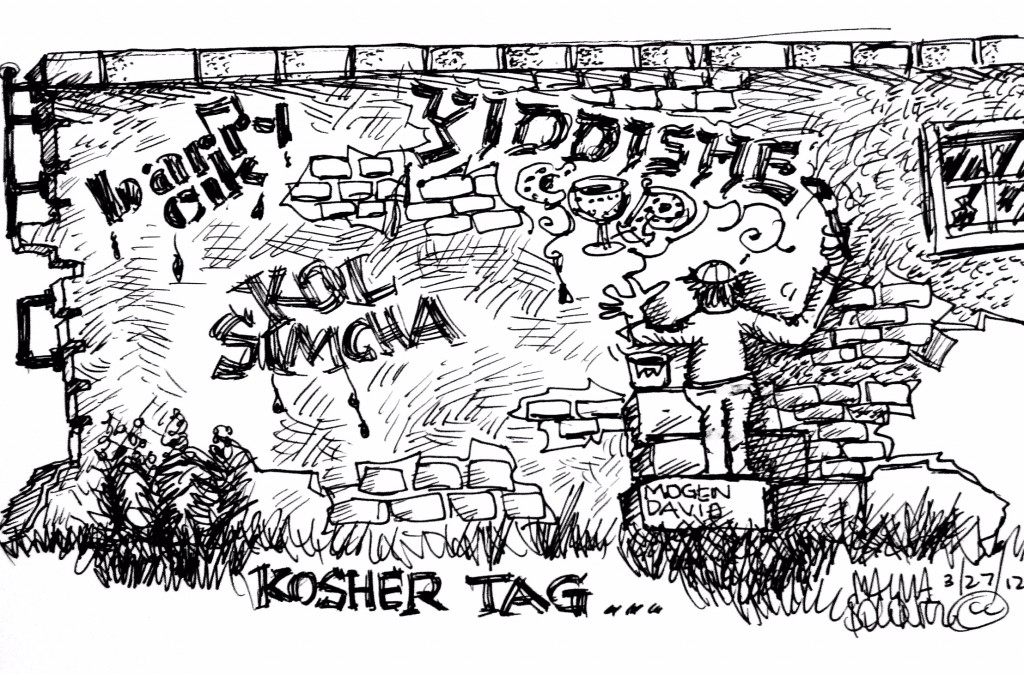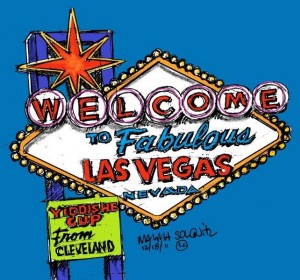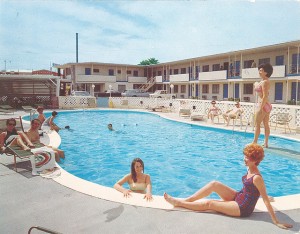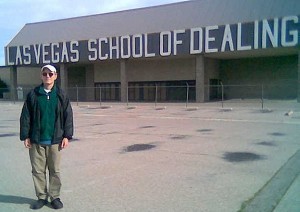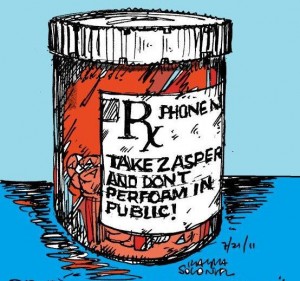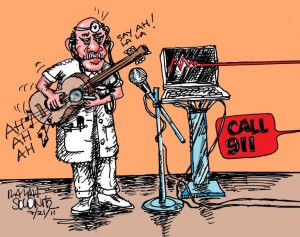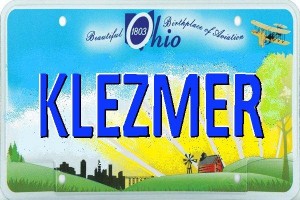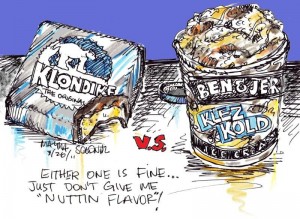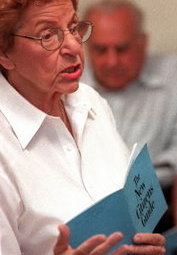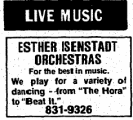Category — Klezmer
PUNCHES WERE THROWN
Rabbi Samuel Benjamin — from my synagogue — was arrested by the cops and beat up by congregants. Then he got fired. He went off to Jerusalem.
He resurfaced stateside in Jacksonville, Florida.
This was in 1926. Rabbi Benjamin fought the great Conservative-Orthodox civil war at the Cleveland Jewish Center, East 105th Street, in the early 1920s.
Rabbi Benjamin oversaw the construction of a huge new sanctuary, complete with a swimming pool, and was supposed to keep the shul Orthodox. He tried. But the Conservatives wanted him out. Punches were thrown. One of the punchers was a certain Philip Rocker. Check it out.* The rabbi left town.
The Cleveland Jewish Center, aka the “Polish synagogue,” aka Anshe Emeth Beth Tefilo, stayed at East 105th Street for a couple decades, then moved to a park-like setting in Cleveland Heights.
I belong to the Heights shul — Park Synagogue. I do not see any signs of civil war. Very few congregants know about Rabbi Benjamin.
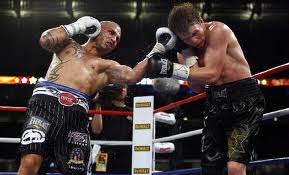 Rabbis don’t get in fights like they used to, either. Does any rabbi don boxing trunks with the Jewish star? I think there is a Russian rabbi in New York who does. [Yes, Yuri Foreman. Photo: Foreman taking a punch from Miguel Cotto.]
Rabbis don’t get in fights like they used to, either. Does any rabbi don boxing trunks with the Jewish star? I think there is a Russian rabbi in New York who does. [Yes, Yuri Foreman. Photo: Foreman taking a punch from Miguel Cotto.]
My rabbi doesn’t fight — my guess. If he does, he’s a welterweight. He’s not big.
Some rabbis play basketball. Several Cleveland rabbis played an exhibition basketball game at the Cleveland Cavaliers pre-game this month. There was no score in ten minutes.
Next year for the pre-game, the rabbis should reenact the Conservative-Orthodox civil war of 1921.
—
* “Near [Rabbi Benjamin’s] house was Philip Rocker, son of Samuel Rocker of The Jewish World. He waited for the rabbi and when he saw him he attacked him and beat him up quite severely.” From Jewish Life in Cleveland in the 1920s and 1930s by Leon Wiesenfeld, 1965.
—
SIDE B
Jumping ahead about 90 years . . .
THE JEWISH WEDDING BAND WARS, 2009
The Orthodox Jewish (OJ) music scene is centered in New York City, where most of the OJ gigs are.
An OJ band not based in New York is called an “out of town” band, even if the band plays its own hometown. There are a couple home-grown “out of town” OJ bands in Cleveland.
The Barry Cik Orchestra dominated the Orthodox Jewish Cleveland music scene in the 1980s. Cik had yikhes (lineage), coming from a long line of distinguished Hungarian musicians. I played a couple gigs with him. His talented son Yehuda became an Ortho pop star.
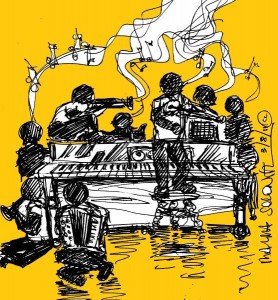 Barry Cik was superseded in Cleveland by the Kol Simcha Orchestra in the 1990s. Some bridal couples perceived Cik as not being frum (religiously observant) enough. The Orthodox world, in general, was becoming increasingly more ritually observant.
Barry Cik was superseded in Cleveland by the Kol Simcha Orchestra in the 1990s. Some bridal couples perceived Cik as not being frum (religiously observant) enough. The Orthodox world, in general, was becoming increasingly more ritually observant.
Cik placed an ad in the Cleveland Jewish Times (no longer in existence) in 1991 that read in part: “I am as scrupulous in shimras Shabbos [guarding the Sabbath] as I can be, and I don’t believe that I’m any less Shomer Shabbos [Sabbath-observant] than most anybody else.”
Cik sometimes played for non-Orthodox Jewish simchas (celebrations) with mixed dancing — men and women dancing together. Kol Simcha — the new band– typically didn’t play for mixed dancing. Kol Simcha picked up a chunk of Cik’s frummer gigs.
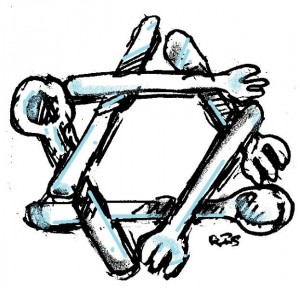 Kol Simcha’s drummer got in trouble for using treyf (non-kosher) meat at his kosher Chinese restaurant, so he left town. Still, Kol Simcha — the band — stayed in business. The lead singer, Rabbi Simcha Mann, was a very good singer.
Kol Simcha’s drummer got in trouble for using treyf (non-kosher) meat at his kosher Chinese restaurant, so he left town. Still, Kol Simcha — the band — stayed in business. The lead singer, Rabbi Simcha Mann, was a very good singer.
Several years later Simcha Mann’s expert keyboard player, Yosef Greenberger, put together a one-man band, which cut into Kol Simcha’s full-band wedding business.
Simcha Mann and Yosef Greenberger took their dispute to an unofficial beis din (house of judgment), where three rabbis decided Greenberger could keep his one-band and Rabbi Mann could have the full-band scene. The two musicians agreed not to cut into each other’s turf.
This ruling held for 13 years, 1996 to 2009.
In 2009 Greenberger and Mann remembered the ruling differently. Greenberger recalled the rabbis saying the ruling was void if new competition came to town. Greenberger’s Jewish-law counsel, his toyan, backed him up in writing. Mann disagreed.
New bands were playing Cleveland. Yosef expanded to a full band. Orthodox bands from Columbus, Ohio, and Detroit came through. A young Orthodox musician started a new Cleveland Ortho band.
Yiddishe Cup joined the fray! But Yiddishe Cup had three major flaws:
1. Yikhes (lineage/pedigree). We had none.
2. We didn’t know the OJ repertoire very well.
3. Yiddishe Cup’s name was unorthodox.
For Ortho purposes, Yiddishe Cup became Shir Perfection. (Shir is Hebrew for song.) We had an Ortho singer who knew all the Ortho tunes. We held a couple rehearsals. These get-togethers were secretly called Project O. (‘O” for Orthodox.) One musician called our project “Project Zero”; he didn’t like OrthoRock music and dropped out.
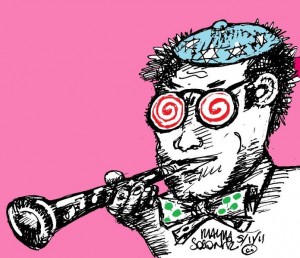 We didn’t get any gigs. We thought we might get a couple. For instance, Yiddishe Cup once played an OJ wedding for the daughter of an Orthodox blues harmonica player. The dad, who didn’t blow on shabbes, sat in with us.
We didn’t get any gigs. We thought we might get a couple. For instance, Yiddishe Cup once played an OJ wedding for the daughter of an Orthodox blues harmonica player. The dad, who didn’t blow on shabbes, sat in with us.
We were looking for Ortho gigs like that.
Still looking.
March 28, 2012 11 Comments
SHREDDING IT
Cleveland is in the middle of the cereal belt. Shredded Wheat of Niagara Falls, New York, is to the east, and to the west is Kellogg’s of Battle Creek, Michigan.
Shredded Wheat moved from Niagara Falls years ago, but the cereal belt remains. Cleveland is the buckle.
Clevelander Marty Gitlin just published a cereal encyclopedia, The Great American Cereal Book (Abrams Images), featuring “hundreds of images of vintage cereal boxes and spokes-characters — Tony the Tiger, Snap, Crackle, Pop, and Lucky the Leprechaun.”
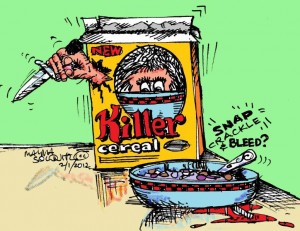
Test-marketed in Cleveland
I had a prospective store tenant who wanted to open a cereal store. He opened down the street and went under almost immediately. He was Cereal Central, aka Cerealicious. Nobody in Cleveland wanted to eat cereal in a store. (He also had a store in Columbus near Ohio State. Apparently, OSU students were willing to eat cereal in a restaurant.)
Most people like to eat cereal alone and not talk about it. That’s my guess.
In my temple bulletin, no bar mitzvah kid’s profile reads: “Jacob is interested in cereal.” More often it’s “Morgan enjoys Sudoku and chatting online, and is a member of the recycling club.”
What is Morgan’s cereal?
Marty Gitlin and I want to know.
***
Musicians — at least one — eat cereal at home after late-night gigs. Musicians can’t fall asleep after gigs. Musicians’ heads are filled with fruit loops of “Simon Tov” and “Hava Nagilah.” (Klezmer musicians’ heads, that is.)
Shredded wheat choices at 1 a.m.: Barbara’s shredded wheat or Quaker shredded wheat. (Shredded wheat is not trademarkable.) I mix Barbara’s with Autumn Harvest (Kashi).
—-
I wrote an “advice column” for the Ann Arbor Observer (February 2012). Check it out: “Hit the Road, Jack . . . A dad’s advice.”
Click here to hear what junior (Jack) is up to today: “Louder Naftule.” The latest in klezmer.
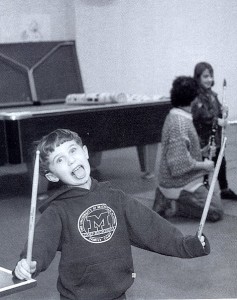
Drummer Jack Stratton, backed by clarinetists Merlin Shepherd and Lucy Stratton. KlezKamp, 1993. (Photo by Al Winn)
February 8, 2012 10 Comments
THE OPTIMAL LEVEL OF JEWISHNESS
If I didn’t lead a klezmer band, I might not hire one. Yiddishe Cup might be too Jewish for me.
“Too Jewish” means anything — or anybody — more Jewish than oneself. Example: Franz Rosenzweig, a German Jewish intellectual, said nothing Jewish — no matter how far out — was alien to him. I tried Franz’s approach: I davened (prayed) with the yeshiva buchers in Boro Park, Brooklyn; drank schnapps at Telshe Yeshiva, Cleveland; and soaked in the mikvah (ritual bath) in Cleveland Heights. Also, I read Rabbi Sherman Wine’s God-is-dead books. I covered a lot of humentashn (bases).
Would I hire a klezmer band?
Yes.
I did. I hired Yiddishe Cup three times — for my kids’ b’nai mitzvot parties. (And I got a decent price.)
1. For my daughter’s bat mitzvah party, I also hired a troupe of hospital-therapy dogs for the cocktail hour.
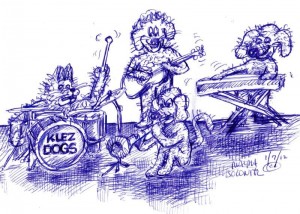
2. For my younger son, we had a DJ party, plus the klez band party. My son organized the DJ party. He hired the DJ — himself.
3. My older son had a trivia quiz, plus the klezmer band. That worked out well. He wound up on Jeopardy!
Yiddishe Cup plays, at minimum, 15 minutes of Jewish music, and we use a dance leader, so everybody knows what to do.
Naturally, the goys like us best. Jews have hang-ups.
I know about Jews and hang-ups. I have belonged to more shuls than the Pope. I was Reform, then Conservative, then Reform, and now Conservative again.
My friends and relatives don’t always hire Yiddishe Cup. But I go to their parties and have a good time. The weddings are enjoyable; the bar mitzvahs are sometimes difficult. The DJ and his “dance facilitators” can be loud and obnoxious. The DJ announces, “The young adults will gather on the dance floor for a group photo.”
Get in the picture yourself, DJ. You look 18. And the “young adults” are not young adults, they’re animals. Stow the glow sticks. Bring out the cattle prods.
The optimal level of Jewishness is Yiddishe Cup with therapy dogs.
—
Yiddishe Cup plays The Ark 8 p.m. Sat (Feb.4), Ann Arbor, Mich. Here is an unrepresentative video from last year’s show:
February 1, 2012 11 Comments
BEST SHOW IN VEGAS
I was back from Las Vegas, attending a Shaker Heights brunch. Several people asked, “Did you play?”
Did Yiddishe Cup play Vegas?
I wish Yiddishe Cup had played Vegas.
I had been in Las Vegas on vacation with my wife, Alice, and older son, Teddy. I had played blackjack.
That was my second trip to Vegas. My first trip was in 1962, when a Vegas waitress predicted I (then-12 years old) would return to Nevada for my honeymoon. That waitress was very wrong.
I prefer outdoorsy vacations.
On my latest trip I won $7.50 at blackjack at the Jokers Wild, then quit. I could hardly breathe in the Jokers Wild –- or in any other Nevada casino — because of the cigarette smoke. I hung around the casino parking lot, waiting for Teddy and Alice to finish up.
My favorite Las Vegas attraction is the Red Rock Canyon, which is similar to Zion National Park, but only 17 miles from Vegas.
The Red Rock performs daily in an original revue that is F’n Crazy! Be a Part of It! Best Show in Vegas for the Past 900 Years!
***
December 28, 2011 5 Comments
NO EVIDENCE OF DISEASE
Doctors like to complain how their pay isn’t what it used to be. Another gripe of docs is the increased paperwork.
But doctors do all right. They are one of the few professions that still hire bands.
A side benefit for Yiddishe Cup is we sometimes get free medical advice at gigs. At a Pittsburgh wedding, a doctor checked one of our guys for a hernia in the men’s room stall.
In Cleveland, a doctor asked me for an appointment. He was a Washington heart specialist, considering a job at the Cleveland Clinic. He played mandolin. He wanted to know if Cleveland had a good quality of life.
I said yes.
He spent several years at the Cleveland Clinic giving me –- and others — the lowdown on HDL. (The lowdown is there is no sure-fire way to raise your HDL.)
Yiddishe Cup occasionally gets gigs from immigrant doctors from South Africa. One doc had a diploma on his office wall from the University of Witwatersrand (South Africa). I thought “witch doctor” — like the doctor in the Mickey Katz parody “My Son the Knish Doctor.” The Katz doc had studied at the Bwana Wana Yeshiva.
South African doctors are often Litvaks (Lithuanian Jews) and plugged into Yiddish culture — what’s left of it.
***
I met a doc at Klezkamp who was atrocious on soprano sax and would repeat, “I’m a doctor! I’m a doctor!” That worked. It made him feel better.
He had a point. He saved lives. So what if he couldn’t play “Khasidim Tantz”?
Yiddishe Cup had a medical student in the band. Dave Jaffe, guitarist/singer and Case medical student. He lasted a year. Med school and the band were too much.
Doctors often form their own bands because of their busy schedules. These bands play a couple benefits a year and often have names like No Evidence of Disease.
I wish I had studied harder in Inorganic and Organic Chemistry. I wouldn’t mind being a brain surgeon with a side interest in klezmer.
Turns out I’m a klezmer musician with a side interest in brain surgery. This scares people.
I accept most insurance plans.
October 5, 2011 3 Comments
THE VANITY OF KLEZMER
I could get the Ohio klezmer vanity plate.
In Chicago, a musician from the Maxwell Street Klezmer Band has the Illinois klezmer. I saw the Illinois plate on the cover of a Maxwell Street CD.
klezmer is taken in New York. I saw New York klezmer in the KlezKamp parking lot.
Ohio klezmer is available, according to the Ohio Bureau of Motor Vehicles.
Do I want klezmer? What if I cut somebody off; they’ll know it’s me. (I remember getting cut off by ezras.)
What if I’m checking out a potential tenant, and I’m parked by the guy’s sleazy mini-market on West 25th Street, and he comes out and has an anti-klezmer ’tude.
I remember mazel on Fairmount Boulevard.
I’ve seen yenta.
I’ve seen gevalt.
On Ohio’s newest license plate, you practically need a microscope to find the OHIO. Why does the state devalue Ohio so much? Ohio is pretty catchy compared to other states. How would you like to live in Maryland?
oHIo.
That’s my gift to the BMV.
Ohio first cluttered its plates in 1973 with Seat Belts Fastened? That innocent public service opened the doors to Birthplace of Aviation, Bicentennial 2003 and Beautiful Ohio.
OHIO in big block letters would work. If the BMV ever goes retro, back to block OHIO, 1950s-style, I would seriously consider klezmer.
I want a plate I can nail to the side of the barn and be proud of.
—
Footnote: Jewish license plates in California are well-documented, per this video:
September 14, 2011 8 Comments
YIDDISHE CUP
AND THE KLONDIKES
Ben & Jerry’s was supposed to hand out free ice cream at last year’s Yiddishe Cup concert in University Heights, Ohio. But Ben & Jerry’s didn’t show up. They received no reminder call from the city, supposedly.
Why would a private business, like Ben & Jerry’s, need a reminder call from the government? Isn’t it supposed to be the other way around?
The University Heights mayor borrowed Yiddishe Cup’s microphone and told the crowd, “Get your tomatoes ready. We’ve had a snafu. There’s no ice cream tonight!”
Nobody booed. There was no ice cream riot. Klezmer crowds are polite. The Russians have assimilated.
Maybe the city will pass out Klondike bars tomorrow night (for the 2011 Yiddishe Cup concert). Easier to deal with — Klondikes. And they’re kosher. Just dole out a few cartons of Klondikes, like in years past.
Ice cream hondling (negotiating) is tough — on the band. Last year’s show was our best because listeners weren’t continually streaming back and forth from the ice cream stand. There was no ice cream stand.
I told the guys in the band to stop making ice cream references. I said, “We might not be asked back if you keep talking about ice cream.”
Yiddishe Cup’s pianist, Alan Douglass, told the audience how happy he was they hadn’t left. He said, “You mean you came to hear us? You really like us!” Let it go, Alan.
Tomorrow at University Heights, see Yiddishe Cup and the Klondikes. That’s my prediction.
—-
Yiddishe Cup plays 7 p.m. tomorrow (Thurs. Aug. 25) at Wiley Middle School auditorium, 2181 Miramar Blvd., University Hts., Ohio. The concert is in the air-conditioned auditorium, rather than on the lawn, due to outside construction. Free admission. Might be ice cream. Might not, too. Call 216-932-7800 for more info.
You’ll hear the premiere of Yiddishe Cup’s song “Warrensville and Cedar Road,” written especially for the Wiley concert.
Here’s a clip of Yiddishe Cup at the Wiley auditorium two years ago:
August 24, 2011 3 Comments
OY: A NEGATIVE REVIEW
A Jew Grows in Brooklyn, Jake Ehrenrich’s one-man Broadway show, was unadulterated nostalgia. Jake even flashed photos of his bar mitzvah on the big screen on stage.
The show came through Cleveland recently. The audience, for the most part, loved the sentimentality and obviousness of the play. Did you know Jake and other Brooklynites played stickball? Did you know Irving Berlin was born Isadore Balin? Did you know Jews wrote many popular Christmas and rock songs?
This just in: Jews like baseball.
What about bark mitzvahs? (Bar mitzvahs for dogs.) Aren’t those (fake) events outrageous and cute? Jake projected dogs in yarmulkes and tallism (prayer shawls) onto the screen.
There are acceptable levels of schmaltz and shtick. Jake exceeded those levels.
I know, Yiddishe Cup is not exactly schmaltz-free. And Yiddishe Cup gets negative reviews too. We’re schmaltzy. We play “Romania” at the end of most of our shows. That is the imprimatur of a klez shtick band. But we also play original comedy tunes and regularly rip off the great Mickey Katz.
We would gladly add more high-brow material to our shows if we could play our instruments better. But we wouldn’t add too much high-brow.
Some high-brow bands are monotonous, repetitive and monotonous. No names here; I don’t want to alienate any of my musician friends. OK, I’ll name one group . . .
Los Muñequitos de Matanzas.
These drum-crazed Cuban dudes play rhythm patterns on four drums for 45 minutes. And that’s just the first set. Very little melodic or harmonic variation. No chording instruments. No talking between songs.
Yiddishe Cup talks. We explain our tunes and ad lib asides. I might say, “Ladies and gentlemen, on keyboards, Winston Churchill.” That’s class.
Jake Ehrenrich, in his show, lifted many old Jewish jokes. That was the best part of his show — his Catskills routine. (And he’s a good singer and musician.)
Jake’s best joke:
Two Jewish men are walking by a church sign:
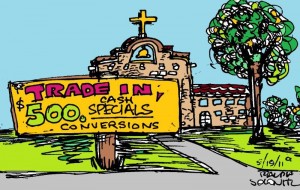
Abe says, “I’m thinking of doing it — converting.”
Murray says, “What? Are you crazy?”
Abe goes into the church and comes out ten minutes later.
“So?” Murray asks. “Did you get the $500?”
Abe says, “Is that all you people think about!”
Hurray for Oy Vey. There’s a market. And I want the T-shirt concession in the lobby.
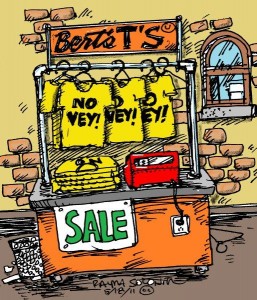
—
For “inside baseball” blog talk, please check out the post below.
May 25, 2011 3 Comments
HOW YIDDISHE CUP STARTED
TAKE ONE:
How did you start Yiddishe Cup?
I got a gig, which other musicians wanted in on.
I made $10 on the gig, and paid the other guys $60 each. We played for the Russian immigrants’ club at the Mayfield Road JCC. The Russians liked our waltzes. Screw klezmer. I hired two musicians who had played with the Kleveland Klezmorim, and a Swiss jazz bass player.
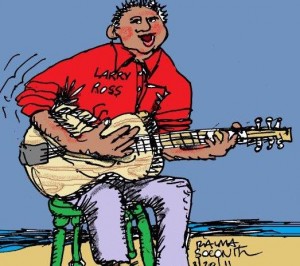 On our next gig, I lost money. I used a black jazz guitarist. All his Dm chords came out like Dm7’s (jazz chords). His name was Jewish, though:
On our next gig, I lost money. I used a black jazz guitarist. All his Dm chords came out like Dm7’s (jazz chords). His name was Jewish, though:
Larry Ross.
How did you get your first gig?
We played for free on John Carroll University’s Jewish hour. The radio show’s host — a cantor, my cantor — couldn’t easily turn down a fellow congregant. Also, he often requested Jewish musicians stop by John Carroll to play on his show, and few did. (John Carroll is a Jesuit school. Does Yeshiva University have a Celtic hour?)
The Yiddishe Cup radio gig impressed our first paying client.
The rest is video . . .
TAKE TWO:
March 30, 2011 3 Comments
ODOR ASSASSIN
My basement — where Yiddishe Cup rehearses — smelled like a skunk.
The skunk was under the stoop by my front door, next to the basement.
I could hardly breathe in the basement. How was I supposed to play clarinet?
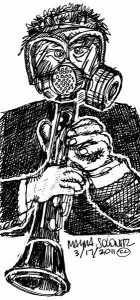
Skunks are bad people. The city won’t deal with them. So I hired a private company, Critter Control.
The Critter Control “technician” liked my collection of Jewish-star necklaces — Purim bling — in my basement. He said he was Jewish. (I run into Jewish handymen more often than most people, I think.) He said, “I don’t know much about the ritual and all that, but my mother was Jewish.”
“If you say you’re Jewish, that’s good enough for me,” I said. And get rid of the skunk, please. He set a trap under the stoop.
And he sold me a can of Odor Assassin for $15. Just three squirts of the spray got rid of the skunk smell in the basement.
When the Yiddishe Cup musicians came over for rehearsal that night, the basement smelled tangy and lemon-lime fresh, courtesy of the Odor Assassin.
But the skunk decided to spray, counterattacking during rehearsal. I thought Yiddishe Cup would disband. I said, “Let me get out my Odor Assassin. It’ll only take five years off our lives, at most.”
The guys agreed to the chemical battle.
Odor Assassin saved Yiddishe Cup’s rehearsal. (No small thing. Some Yiddishe Cup musicians drive up to 35 minutes to rehearsal.)
Yiddishe Cup rarely endorses products. To date: Golden Herring and all sardines. Add Odor Assassin.
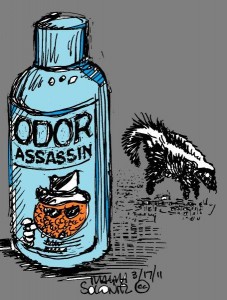
March 25, 2011 2 Comments
FIVE UNEASY PIECES
1. My father had a game idea Let’s Blow Up the World. I apportioned the megaton bomb ratings to various countries. What kind of bomb did Paraguay deserve? An M-80 firecracker? Let’s Blow Up the World never made it past “high concept.”
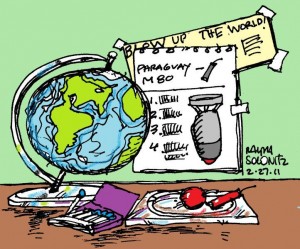
2. Alan Douglass, Yiddishe Cup’s keyboard player, was a klezmer-revival pioneer. He could have called klezmer “anchovy pear music” in Cleveland in the 1980s and people would have believed him.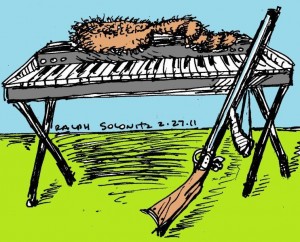 Alan let other musicians start the klez bands. These others musicians got the extra money for being bandleaders. What can a gentile do? It wouldn’t have looked right for a goy — Alan — to lead a klez band.
Alan let other musicians start the klez bands. These others musicians got the extra money for being bandleaders. What can a gentile do? It wouldn’t have looked right for a goy — Alan — to lead a klez band.
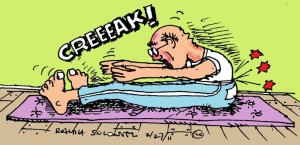 3. Len Gold, a Cleveland ad man, wanted to make a Yiddishe Cup exercise video, Stretch ‘n’ Kvetch, to sell at temple gift shops. Never happened.
3. Len Gold, a Cleveland ad man, wanted to make a Yiddishe Cup exercise video, Stretch ‘n’ Kvetch, to sell at temple gift shops. Never happened.
4. Don Friedman, Yiddishe Cup’s drummer, was on What’s My Line in 1966. Don’s line (job) was testing drums for the Rogers Drum Co. in Cleveland. (He was a drum tester, not a rum tester.) Don probably could have had several more minutes of fame if he had asked Bennett Cerf to explain his name.
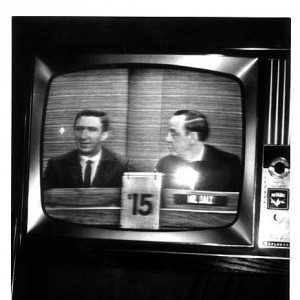
Don Friedman (L) with host John Daly
—
5. Yiddishe Cup had a gig lined up for Fuerth, Germany, but the klezmer festival organizers there changed directors, or something, and we got canned. I heard years later, through the klez grapevine, that Yiddishe Cup will never play Fuerth. “They don’t like you!” That’s the word on K Street.
Why don’t they like us? Maybe because I wrote the festival committee: “For three years we think — with good reason — we will be playing a concert in Germany. Then, boom, it all goes kaput!” I ended with a string of rage: “unscrupulous,” “shameful” and “dirty.” I did not play the race card. I did not call the klez-festival organizers anti-Semites.
March 4, 2011 6 Comments
JAMMIN’ WITH THE SALMON
“Struttin’ with Some Barbecue” by Louis Armstrong is probably the best song title. It has action, smell and humor.
The worst title is “Rise Up to New Jewish Music.” A couple Jewish bands go for that sort of thing. They are not playing klezmer — which peaked a while ago. They are playing “New Jewish Music.”
Anything new is old.
Several newer klezmer bands don’t use klezmer in their names. Like Shtreiml, Golem and the Kosher Spears. (That last band is made up.)
“Yiddishe Cup,” the name, gets the job done around town, but doesn’t get us any gigs at Ashkenaz or other mohel’s-edge international music festivals. “Yiddishe Cup” is bubbe’s procus (grandma’s stuffed cabbage.).
Before Yiddishe Cup released its latest CD, Klezmer Guy, I test-drove several album titles. One was Jammin’ with the Salmon.
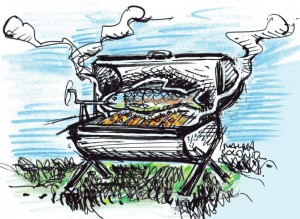
Smokin' salmon
Nobody understood it. “Nobody” was my wife, Alice. I didn’t run the title by anybody else. I didn’t want the aggravation of more artistic input. I’m not running a democracy. I settled on Klezmer Guy. It gets the job done.
— Bert Struttin’
February 11, 2011 1 Comment
A MIKE NAMED MOISH
Klezmer violinists often don’t get along with klezmer clarinetists. The animosity goes back to the late Chagall era.
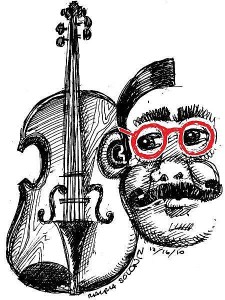 In the early 1900s, recording engineers favored the piercing clarinet over the murky violin. Studios had big acoustic horns the musicians played into. The clarinet’s sound picked up better than the violin’s. The clarinet’s ascendancy was quick, and the violin became passé and alter heym (old country).
In the early 1900s, recording engineers favored the piercing clarinet over the murky violin. Studios had big acoustic horns the musicians played into. The clarinet’s sound picked up better than the violin’s. The clarinet’s ascendancy was quick, and the violin became passé and alter heym (old country).
Violinists are sensitive about this.
Violinists don’t like playing second fiddle. They ask for “more violin” in the monitor mix and the house mix. (The “monitor mix” is what the band hears on stage. The “house mix” is what the audience hears.)
Truce time . . .
Let’s just forget about mikes. You don’t see them at New Orleans parades. You don’t see them at bluegrass jam sessions. Ban mikes. Let lungs rule.
Yiddishe Cup’s keyboard player, Alan Douglass, likes to get to concerts early to talk about mikes with the sound mixologists. Alan is Yiddishe Cup’s spokesman to the sound guys; if I would let the other band members chime in, we would spend the entire sound check saying, “more clarinet,” “more violin” and “more vocal.” Every musician has a focus — himself.
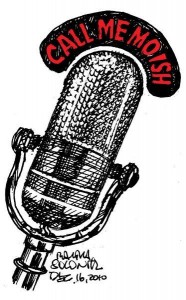 I tell the sound techs, “Can you turn my moish up?” (I like moish better than mike. As for mic, that is totally absurd. Fiction alert.)
I tell the sound techs, “Can you turn my moish up?” (I like moish better than mike. As for mic, that is totally absurd. Fiction alert.)
Before Yiddishe Cup goes on stage, the sound guys — for no apparent reason — spin all the dreidels on the mixing board, and we sound like soup.
Throw away the mikes, musicians. If you can’t hear yourself, so what? You shouldn’t have taken up violin.
February 4, 2011 4 Comments
HALF A NAGILA
January is the big month for wedding planning. Yiddishe Cup usually advertises in the Cleveland Jewish News “Weddings” supplement, which comes out next week.
Women ponder dresses, make-up and plastic surgery. There are also ads for face lifts. The face lift ads are for mothers of the brides, presumably.
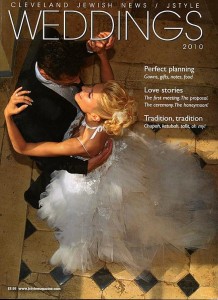 There isn’t much talk about music in the wedding mag supplement. It’s more about dresses, flowers, rings and gifts for the bridal party. Destination weddings are another major topic.
There isn’t much talk about music in the wedding mag supplement. It’s more about dresses, flowers, rings and gifts for the bridal party. Destination weddings are another major topic.
The wedding bands in the CJN supplement are usually of a certain type: sexy female lead singer, black male singer, plus a lot of horns and guitars.
Then there’s Yiddishe Cup (we place a small ad): no females, no blacks and a lot of Jews.
A lot of Jews can’t stand a lot of Jews. The majority of Jews want just a few minutes of “Hava Nagila” at a wedding. They want half a Nagila.
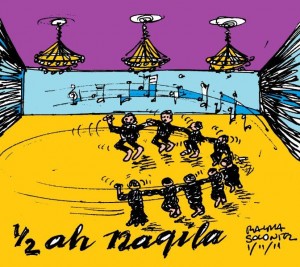
A prospect asked for a five-minute hora. I told her a Yiddishe Cup hora has to be at least 10 minutes.
She said, “In that case, I’ll give my DJ a CD for a five-minute hora.”
January 14, 2011 3 Comments
WHAT ARE YOU EATING FOR NEW YEAR’S?
Not all musicians have gigs on New Year’s Eve.
A lot of would-be partiers stay home for a quiet evening, or they go to the movies. There aren’t that many gigs. The era of the fraternal organization New Year’s Eve dinner dance is long gone.
Sometimes people eat special New Year’s Eve foods. I know a family that eats lobster. My family eats oatmeal on New Year’s Eve. We learned that habit in Akron, Ohio.
 Yiddishe Cup had a gig at First Night Akron for 12 years in a row, and occasionally my family stayed overnight at the Quaker Square hotel, which was in a remodeled Quaker Oats grain silo. The hotel’s New Year’s Eve dish was oatmeal, served at midnight.
Yiddishe Cup had a gig at First Night Akron for 12 years in a row, and occasionally my family stayed overnight at the Quaker Square hotel, which was in a remodeled Quaker Oats grain silo. The hotel’s New Year’s Eve dish was oatmeal, served at midnight.
Yiddishe Cup didn’t play First Night Akron last year. The event coordinator called and said, “We’re reducing our footprint.”
My wife, Alice, plus a Yiddishe Cup musician and his wife, made a small dinner and then we went to the movies. Not memorable, except for the oatmeal.
Klezmer musicians around the country lamented the downsizing of First Nights. This kvetching started a couple years ago on a Jewish-music listserv. First Nights had been the rage in the 1990s but had become part of the scenery. (Similar to klezmer music’s popularity arc.) In the 1990s, the director of First Night Akron told me she had just been to a national First Night conference in Boston and the word was “get a klezmer band.”
Yiddishe Cup worked up to playing First Night Akron. We played Warren, Ohio, First Night a couple times prior. (A good event.)
Last year I checked out First Night Akron’s program online. I looked to see if another klezmer band was playing. There was a Beatles tribute band, a blues band and a couple generic American acts. That was gratifying.
Yiddishe Cup is back at First Night Akron this year. “Raisins and Oatmeal.” That will be our opening song. No, it won’t. The tune doesn’t exist. We’ll open with
“Shalom Aleichem” — the version made popular by Shmuel Brazil and Regesh.
—-
Yiddishe Cup plays First Night Akron this Friday., 7:30 p.m.
—-
Sports fans, please see the post below too.
December 29, 2010 4 Comments
WAVING O’ THE GREEN
The highest paid Jewish communal worker in America is Steve Hoffman, president of the Jewish Community Federation of Cleveland — a united charities for Jews. Hoffman makes $687,000 a year.
He makes more than double the Atlanta federation president’s salary; 86 percent more than the Detroit chief; 56 percent more than the Chicago president; and more than the boys in New York. [Source: Forward]
This gives Cleveland Jews another excuse not to give tzedakah (charity). Donors want reasons not to give.
“That’s disgusting. He should be in private industry,” said a friend of mine.
Another friend stopped giving to the federation because a volunteer called and asked my buddy to up his pledge. My friend didn’t like the personal touch; he stopped giving altogether.
I asked the federation to switch my pledge solicitor. I was in the federation’s real estate division — where the heavy-hitters are — and I didn’t want a phone call from an owner of a “lifestyle” shopping center, on principle. Now I have a friend who solicits me. And with email, it’s all pretty painless.
I give.
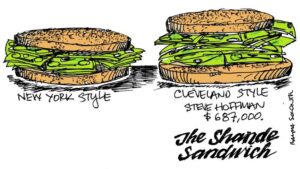 But when I read in the Forward last week that Steve Hoffman is making two cents for every dollar the Cleveland campaign raises, I had second thoughts on Hoffman’s two cents. A sizable chunk of the federation’s annual $28.8 million campaign is going to Hoffman.
But when I read in the Forward last week that Steve Hoffman is making two cents for every dollar the Cleveland campaign raises, I had second thoughts on Hoffman’s two cents. A sizable chunk of the federation’s annual $28.8 million campaign is going to Hoffman.
On the other hand, Hoffman is no doubt a capable executive, dealing with very finicky donors around the clock. He also oversees the federation’s enormous endowment and philanthropic funds. He was offered $687,000 a year and took it. That’s not a crime. He’s probably a good guy. Just an overpaid good guy.
In my father’s day, the federation published an annual blue book that listed everybody’s contributions. My dad was proud he was “anonymous.” My former rabbi, Michael Hecht, differed. Rabbi Hecht said it was best to attach your name to your contribution so peers would be embarrassed and/or motivated to give more. (The bell rings . . . Rabbi Hecht vs. Maimonides.)
The best place to give — at least in the non-Jewish realm — is to the Salvation Army. The Salvation Army is a religion. The Sallies — the troops — are almost like nuns. The Sallies don’t spend much on overhead. They are in the streets, doling out food. And don’t forget about their brass bands.
Every year I write on my Salvation Army donation: “I’m Jewish.” I got a call from the major once. He didn’t mention the Jewish part.
The most ardent fund-raising drive ever, surprisingly, was at Klezkamp — the artsy klezmer convention. A spirited 80-something New Yorker took center stage and asked for pledges. He announced the pledges and checks . . . $18, $25, $36, $50. A musician gave $5,000. That was Gates-ian. When all the pledges were counted, the speaker said: “Here’s something I learned from our Irish friends. It’s called the waving o’ the green.” He took a dollar from his wallet and waved it. Klezkamp volunteers with buckets circulated through the crowd to collect bills the audience waved back.
It was good theater, somewhat creepy, and somewhat effective. A buck goes into the bucket. “Transparency” in action. Nobody at Klezkamp was making $687,000 from that bucket.
—-
Please see the post below too. It’s fresh paint.
—-
And win a free CD — One Ring Zero’s Planets — by entering Zeek‘s First Klezmer Liner Note Contest. Zeek is a Jewish Journal of Thought and Culture. I wrote the rules for the Zeek contest. Click here to enter, or just to read the nutty rules.
—-
Yiddishe Cup plays First Night Akron (Ohio) 7:30 Fri. , Dec. 31.
December 22, 2010 3 Comments
WALKMAN MAN
Walt Mahovlich, the leader of the Gypsy-style band Harmonia, had hundreds of cassette tapes in his living room. He had custom-made bookshelves lined with tapes. There were Yugoslavian field recording from the 1970s and commercial ethnic tapes from the 1980s and 1990s. And he had dubbed some LPs to tape.
Walt’s wall o’ tapes was organized by nationality: Albanian, Croatian, Hungarian, Jewish, Macedonian, Romanian, Rusyn, Serbian, Slovak and Turkish.
A tape — a brand-new chrome tape with Dolby — often sounded as good as the original LP. But few dubbers bought chrome. Even the commercial tapes released in the 1980s weren’t always chrome.
One big downside to tape: the tape player would occasionally eat the skinny tape, and you’d have to splice it back to health.
The cassettes, with their cases, were compact. Give them that.
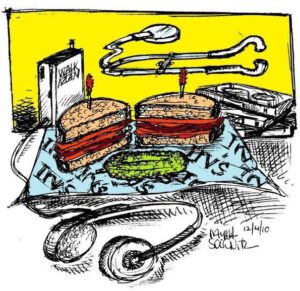 I bought a Sony Walkman cassette player in 1981, just prior to my first son’s birth. My wife, Alice, went through three 24-hour shifts of obstetricians before she delivered. I had the cassette tapes (dubbed jazz LPs) and two corned beef sandwiches from Irv’s Deli. I was set. My wife had complications.
I bought a Sony Walkman cassette player in 1981, just prior to my first son’s birth. My wife, Alice, went through three 24-hour shifts of obstetricians before she delivered. I had the cassette tapes (dubbed jazz LPs) and two corned beef sandwiches from Irv’s Deli. I was set. My wife had complications.
The doctors wanted to check it out. Not the complications. The Walkman. They had never seen one.
Three years ago I bought a Chinese Walkman knock-off for $40 at Radio Shack. I thought the Walkman might disappear.
Sony recently announced the end of Walkman cassette player production.
Two words: Stock up.
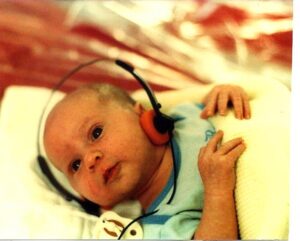
Teddy Stratton, 1 month
***
Walt Mahovlich’s wall o’ tapes still exists in the same West Side living room.
Last week Walt said, “I should transfer my tapes to digital. Who knows how long they’ll last — the tapes. But what I really need to do is record a 78 — something that will really last!”
“You want to record a 78 RPM?”
“Yes. Alan [Yiddishe Cup’s keyboard player] has a 78-making machine. I saw it years ago. I want to record a tune, then prematurely age the disc — the 78 — and place it in strategic places for people to find.”
“Like at Goodwill stores?”
“Maybe. It’ll be a hoax, like Piltdown Man.”
“An original tune?”
“No, a clarinet piece I learned years ago. I’ll call it ‘Der Freylekher Bulgar’ for the Jewish market and ‘Lerinsko Narodno Oro” for the Macedonians. It’ll be the same tune, two markets. Like Tarras.” *
“Do you have a Walkman?”
“No, I’ve never had one.”
“You should get one.”
“I have a tape deck. I’m set.”
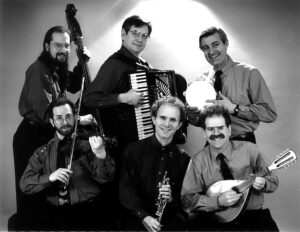
Walt, on accordion, had an aura. 1983
—–
* Dave Tarras, klezmer clarinetist, sometimes “re-gifted” his Jewish tunes to fit the Greek market, and vice versa.
“Der Freylekher Bulgar” is Yiddish for “The Happy Dance.” “Lerinsko Narodno Oro” is Macedonian for “Lerin Region Folk Dance.”
Thanks to Lori Cahan-Simon, musician and Yiddishist, for the correct spelling on “Der Freylekher Bulgar.”
December 10, 2010 3 Comments
MIRROR IMAGES
Yiddishe Cup occasionally plays mirrored halls.
Take La Vera. Or Casa di Borally. Or La Malfa (no mirrors but still heavy Italian).
Our latest mirrored hall gig was Armenian. Yiddishe Cup knows two Armenian tunes, which gets us through the night. We mix them with klezmer, jazz and pop.
I’m not bad on “Cold Duck Time” by Eddie Harris. Not good either.
I thought there were 300 people at the La Vera gig, because of the mirrors. There were about 150 people.
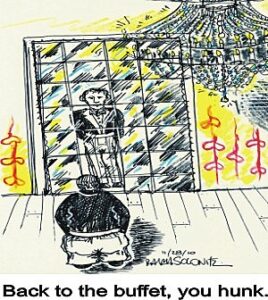
A guest asked if Yiddishe Cup is available July 11, 2011, for his daughter’s wedding at La Malfa. Yes, La Coppa Yiddishe is available, and call soon. July 11 is “tomorrow” in the band biz.
***
The premier mirrored hall in Ohio is the Hall of Mirrors at the Hilton Netherland Plaza in Cincinnati. That mirrored hall, built in 1931, is modeled after the Palace of Versailles.
Yiddishe Cup played a wedding in the Cincy hall for the great-grandchild of Arnold Schoenberg. A guest even sang a medley of Schoenberg art songs midway through the reception. That was a bigger party-killer than benching (post-meal prayers).
Yiddishe Cup is playing a Cincy wedding tomorrow night at the National Underground Railroad Freedom Center. We’ve never played there. Mirror situation, per favore?
—-
Illustration by Ralph Solonitz.
December 3, 2010 4 Comments
THANKSGIVING WEDDING . . . SICK
When the mother of the bride says you’re on for the wedding, you’re not always on. The bride, not the mother, makes all final decisions. The bride can — and will — override Mom.
I once negotiated a Thanksgiving Day wedding. The mom thought Thanksgiving would be the perfect wedding day, because nobody would come. The groom’s side was from New York, so flights to Cleveland would be expensive. Terrific. And the locals would pass on the wedding to eat Thanksgiving dinner at home with their kids, who wouldn’t be invited to the wedding. Also, terrific.
I listened to this for three phone calls.
Then the mom hired Yiddishe Cup.
Yes!
The band members rescheduled their own Thanksgiving dinners. Not an easy task.
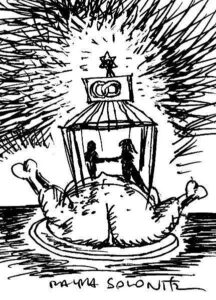 The mom called a fourth time and said the bride wanted a different band. I didn’t even ask who. I usually ask, but I was so mad — mostly at myself because I had forgotten the rule “it’s all about the bride.”
The mom called a fourth time and said the bride wanted a different band. I didn’t even ask who. I usually ask, but I was so mad — mostly at myself because I had forgotten the rule “it’s all about the bride.”
[Exception: A mom booked us for a Cleveland wedding, and the bride — from Seattle — ran up to the bandstand and said, “I hate klezmer music! How could my mother do this to me!”]
After Ms. Thanksgiving Turkey hung up, I called a second client — a bat mitzvah mom — who was late with her contract and deposit.
She said she wanted to talk more. I had already talked to her several times. I said, “Yiddishe Cup has been around over twenty years. You’ve seen us. Everybody has seen us. You know what we’re all about.”
She said her husband was sick.
Pause. Sick in the band biz means very ill. It sometimes means dying. I’ve played simchas (celebrations) for sick people; these affairs are the most poignant. I’ve seen dads roll down the aisle in wheelchairs. Dads who couldn’t talk because of strokes. Guys with half a brain left.
Yiddishe Cup has played for dead people; we played a bat mitzvah luncheon where the bat mitzvah girl’s mom died the day before. The funeral was the next day. We played in the family room instead of at the party center. Two or three people tried a hora.
The woman with the sick husband came to my house to further discuss the bat mitzvah. I asked what her husband’s illness was. She said he was depressed. Her husband — a doctor — had lost a patient that week.
He wasn’t sick! Doctors lose patients all the time! She just wanted to change the date, the number of musicians, and a few other things. Which she did.
The gig — on a new date, with fewer musicians — was surprisingly fun. Everybody was upbeat, and nobody bugged the band, except the good-natured grandfather, who said to our pianist, “Do you know your fly is down.”
Our pianist, not missing a beat, answered, “No, can you hum a few bars?”
Nobody was sick. That was something to be thankful for.
—-
Please see the post below too. It’s fresh.
—
Yiddishe Cup plays Columbus, Ohio, 6 p.m. Sun., Dec. 5. Chanukah. Please contact Tifereth Israel Congregation for details.
—
Illustration by Ralph Solonitz.
November 24, 2010 6 Comments
THE ESTHER ISENSTADT ORCHESTRAS
Bass player Esther Isenstadt ran classified ads in the back of the Cleveland Jewish News in the 1970s and 1980s: “Sophisticated music for discriminating people” . . . “Leave your records at home and bring LIFE to your party” . . . “From ‘The Hora’ to ‘Beat It.'”
Esther was gigging regularly when Yiddishe Cup started in 1988. I didn’t run into her. She was working the senior-adult circuit, while Yiddishe Cup was doing the glam jobs: bar mitzvahs and weddings. Esther was not a klezmer musician. She played mostly classical and pop — and some Jewish.
When I eventually met Esther, she was in The Weils assisted living facility. She was 86 (2003). She approached me after a Yiddishe Cup senior-adult program to say hello. I told her I knew of her. She smiled. I had one of her songbooks; I said I bought it used at the Cleveland Music School Settlement. She smiled again. Then she didn’t smile. She said, “I never thought I’d end up here!”
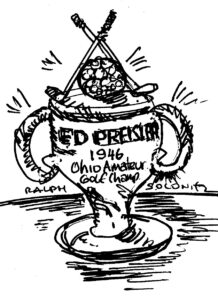 Ed Preisler — another Weils resident — chimed in, “I came out here to die.” (Ed died six months later.) Ed was the 1946 Ohio Amateur Golf Champion.
Ed Preisler — another Weils resident — chimed in, “I came out here to die.” (Ed died six months later.) Ed was the 1946 Ohio Amateur Golf Champion.
Ted Bonda, the former owner of the Cleveland Indians, was also there. I switched gears; I asked Ted, Ed and Esther — and the other people schmoozing after the program — if they knew Mickey Katz. One resident knew Mickey from Yale Avenue, Cleveland; another, from Berkshire Road, Cleveland Heights.
I asked the group if they were familiar with the word kile (hernia). Nobody knew it. That was surprising. Kile is the punch line in Mickey Katz’s song “16 Tons [of Hard Salami]” . . . “The balebus (boss) promised me a real gedile (glory), instead of geldile I catched me a kile (hernia).” The Weils was apparently not heavy-duty Yiddishists.
Esther Isendstadt had played in four suburban orchestras, raised a family, taught elementary school, led party bands and taught ESL in “retirement.” She was a Glenville High graduate, as were Bonda and Preisler. Glenville High was where Jewish overachievers went to high school in the 1930s. [John Adams High students — like my parents — would have disagreed with that. John Adams, in the Kinsman neighborhood, was more proste (working-class) than Glenville, but equally proud.]
I learned “Shir Lashalom” (A Song of Peace) from Esther’s book. That tune was a must-play in 1995 — the year Yitzhak Rabin was assassinated. The lyrics were in Rabin’s pocket when he got shot.
Esther had rubber-stamped Esther Isenstadt Orchestras on every other page of the used song book. A Jewish bandleader with a rubber stamp.
I got a rubber stamp.
Esther died last month at 93.
There weren’t many bands with names like the Esther Isenstadt Orchestra in the 1970s. There still aren’t.
—-
Illustration by Ralph Solonitz.
November 19, 2010 5 Comments


